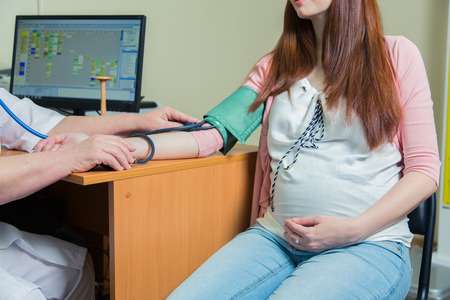Risks of Multiple Pregnancy: High Blood Pressure

Risks of Multiple Pregnancy: High Blood Pressure
While many complications in multiple pregnancy put the babies at risk, one in particular jeopardizes the mother. Mothers of multiples are particularly susceptible to a group of diseases associated with elevated blood pressure (hypertension).
Pregnancy Induced Hypertension (PIH)
Increased blood pressure—generally measured as higher than 140 over 90—is common in mothers of multiples. It is treated by reducing activity, even to the point of bed rest, and sometimes with medication. Generally, hypertension associated with pregnancy will dissipate as soon as the babies are born, but these women may be at risk for high blood pressure later in life, especially in subsequent pregnancies.
Preeclampsia/Toxemia
A more serious condition affecting mothers of multiples is preeclampsia, also known as toxemia. Less than 10 percent of singleton pregnancies are impacted by preeclampsia, but it is much more common in mothers of multiples. About one in three women expecting twins, triplets, or more will suffer from it during pregnancy. While it is often confused with hypertension, two other symptoms must be present in order for a diagnosis of preeclampsia to be confirmed: edema and elevated protein in the urine.
The elevation in blood pressure inflicts damage to small capillaries, which leak fluid into surrounding tissue and cause edema, or swelling. Most pregnant women experience some degree of swelling, especially in the later months of pregnancy, but edema is characterized by a sudden onset that persists throughout the day. In addition to edema, preeclampsia is characterized by proteinuria, the presence of significant amounts of protein in the urine (this signifies kidney malfunction). Preeclampsia can precede a more serious condition, eclampsia, which can lead to seizures, stroke, kidney failure, a ruptured liver, and problems with blood clotting.
Essential
There is evidence to suggest that a diet rich in calcium and omega-3 fatty acids in the form of fish oil can reduce the incidence of preeclampsia in pregnancy. You should discuss the possible benefits of this with your health-care provider before taking any dietary supplements.
Preeclampsia usually affects women in the latter half of pregnancy, but the longer a woman combats it, the greater the potential for complications. There is no cure for the condition; the only remedy is to deliver the babies. Medical caregivers have to weigh the deterioration of the mother's state against the babies' outlook for survival if born early.
Notify your doctor immediately if you experience the symptoms of preeclampsia, including sudden swelling in the hands or face, rapid weight gain, blurred vision, seeing spots, intense headache, or abdominal pain. Generally, at the first sign of symptoms, you'll be advised to restrict your activity and may even be assigned to bed rest. Sometimes medications may be administered, such as magnesium sulfate, a drug commonly used to treat preterm labor that also temporarily lowers blood pressure.
HELLP Syndrome
Fifteen percent of women with preeclampsia will develop HELLP syndrome, an abbreviation for hemolysis, elevated liver enzymes, and low platelets. This condition is due to disturbance of the liver's normal function, and mothers with HELLP can die from a ruptured liver if they are not treated. Sometimes the syndrome progresses before the symptoms of preeclampsia are identified, because women can develop HELLP in the absence of hypertension, edema, and protein in the urine. Be sure to report any unusual symptoms to your doctor, such as abdominal pain on the right side, fatigue, nausea, vomiting, or headache. These can be signs of HELLP syndrome.